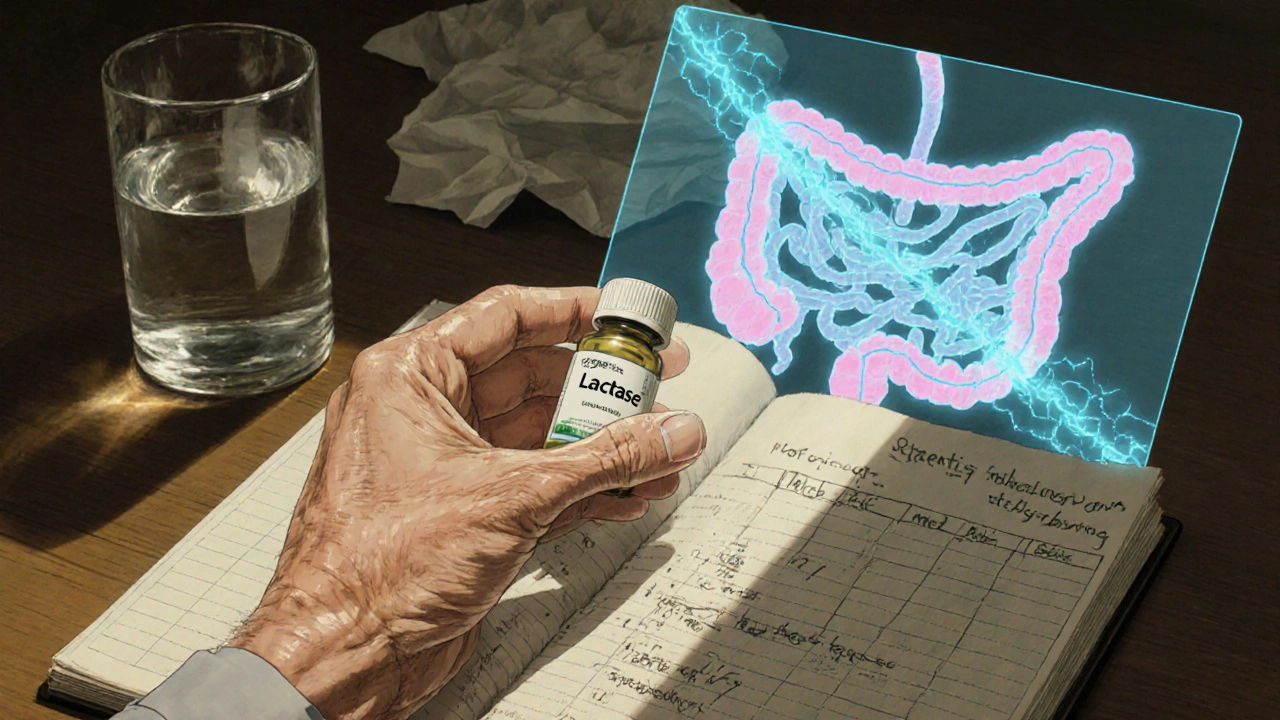Many older adults wake up feeling swollen, tight in the stomach, or like they’ve eaten a full meal just by drinking water. It’s not just discomfort-it can make walking, sleeping, or even sitting comfortably a challenge. This is meteorism: excessive gas in the digestive tract that causes bloating, pressure, and sometimes pain. It’s not rare in people over 65. In fact, studies show over 60% of seniors experience regular abdominal bloating, and many don’t realize it’s treatable.
Why Does Meteorism Happen More in Older Adults?
As we age, our digestive system doesn’t work the same way it did in our 20s or 30s. The muscles that move food through the intestines slow down. Stomach acid production drops. The balance of good bacteria in the gut shifts. All of this makes gas build up more easily and escape more slowly.
One major reason is reduced motility. The intestines don’t contract as strongly or as often. Food sits longer, fermenting and producing more gas. This is especially true with high-fiber foods like beans, broccoli, and whole grains-foods doctors often recommend for seniors to prevent constipation. But for some, those same foods become gas factories.
Another factor is medication. Many elderly people take multiple prescriptions. Common ones like calcium channel blockers for blood pressure, opioids for pain, and even some antidepressants can slow digestion. Antacids with aluminum or magnesium can alter gut bacteria. Even daily supplements like iron or calcium can contribute to bloating.
Swallowing air is another silent culprit. Seniors may eat slower, but they also tend to chew gum, sip through straws, or wear ill-fitting dentures that cause them to take in more air without realizing it. That swallowed air ends up in the gut, adding to the pressure.
Common Triggers You Might Not Realize
It’s easy to blame beans or cabbage, but other everyday habits play a bigger role than most people think.
- Dairy products: Lactose intolerance becomes far more common after age 50. The body produces less lactase, the enzyme that breaks down milk sugar. A glass of milk or a scoop of ice cream can trigger bloating hours later.
- Artificial sweeteners: Sorbitol, mannitol, and xylitol-found in sugar-free gum, diet sodas, and some medications-are poorly absorbed. They draw water into the gut and feed gas-producing bacteria.
- Carbonated drinks: Even one soda a day adds hundreds of milliliters of air to the digestive system. Sparkling water isn’t much better.
- Low fluid intake: Dehydration thickens stool and slows transit. The result? More fermentation and more gas.
- Low physical activity: Sitting most of the day reduces gut movement. A 15-minute walk after meals can make a noticeable difference.
Some seniors also avoid certain foods because they’re afraid of bloating. But cutting out entire food groups without guidance can lead to nutrient gaps. Fiber is still important for bowel health, but the type and timing matter.
How to Manage Meteorism Without Medication
Before reaching for over-the-counter gas pills, try these simple, evidence-backed changes.
- Chew food slowly and thoroughly. Breaking food into smaller pieces before swallowing reduces the workload on the gut and minimizes swallowed air. Aim for 20-30 chews per bite.
- Eat smaller, more frequent meals. Large meals overwhelm a slower digestive system. Try five small meals instead of three large ones.
- Keep a food and symptom diary. Track what you eat and when bloating happens. Look for patterns over a week. Common triggers show up fast-like dairy after lunch or soda after dinner.
- Limit gas-producing foods temporarily. Try cutting back on beans, lentils, onions, garlic, cabbage, and Brussels sprouts for two weeks. Then reintroduce them one at a time to see which ones cause trouble.
- Drink water between meals, not during. Drinking while eating can stretch the stomach and dilute digestive enzymes. Sip water 30 minutes before or after meals instead.
Physical movement is one of the most underrated tools. Gentle walking after meals stimulates peristalsis-the wave-like muscle contractions that move food along. Even standing up and stretching every hour helps. For those with limited mobility, seated leg lifts or gentle belly massages in a clockwise direction can encourage gas to move.

When to Consider Probiotics or Digestive Enzymes
Not all supplements work for everyone, but some have solid backing for seniors.
Probiotics like Bifidobacterium infantis and Lactobacillus acidophilus have been shown in clinical trials to reduce bloating in older adults. Look for products with at least 10 billion CFUs and multiple strains. Take them daily for at least four weeks-effects aren’t immediate.
For dairy-related bloating, lactase supplements taken right before consuming milk or cheese can prevent symptoms. They’re available as tablets or drops. One tablet usually handles one serving of dairy.
For gas from beans and vegetables, alpha-galactosidase (sold as Beano) breaks down complex sugars that the body can’t digest. It’s taken just before meals. Many seniors find it helps without side effects.
Important: Avoid unregulated herbal blends or “gut detox” products. They often contain laxatives or diuretics that can worsen dehydration or electrolyte imbalances in older adults.
Medications That Help-And Which to Avoid
Over-the-counter options like simethicone (Gas-X, Mylanta Gas) break up gas bubbles. It’s safe for seniors and works quickly, but it doesn’t stop gas from forming-it just makes it easier to pass. Use it as needed, not daily.
Activated charcoal is sometimes used, but evidence is weak. It can also interfere with prescription medications if taken at the same time. Don’t use it without checking with a pharmacist.
Antispasmodics like dicyclomine can help with cramping, but they often cause dry mouth, constipation, or confusion in older people. These are rarely recommended unless bloating is tied to IBS and other options have failed.
Never use laxatives regularly unless directed by a doctor. Chronic constipation can make bloating worse, but laxatives don’t fix the root cause-and can lead to dependency.

Red Flags: When Bloating Is More Than Just Gas
Most meteorism is harmless. But some signs point to something more serious.
- Bloating that gets worse over weeks or months
- Unintentional weight loss
- Blood in stool
- Persistent nausea or vomiting
- Pain that wakes you up at night
- Swelling in the abdomen that feels hard or irregular
These could signal colon cancer, ovarian cancer, gastroparesis, or bowel obstruction-all conditions more common in older adults. If any of these symptoms appear, see a doctor. A simple abdominal ultrasound or colonoscopy can rule out serious issues.
What Works Best: A Real-Life Example
Mary, 72, from Melbourne, started feeling bloated every afternoon after lunch. She’d been eating salads with beans, drinking sparkling water, and taking a calcium supplement with meals. She was also on a blood pressure pill that slowed her digestion.
She kept a diary for 10 days. The pattern was clear: bloating hit 90 minutes after lunch, always after beans and sparkling water. She switched to still water, swapped beans for lentils (which she tolerated better), took her calcium at bedtime, and started a 10-minute walk after meals.
Within two weeks, her bloating dropped by 70%. She didn’t need pills. Just small, smart changes.
Final Thoughts: You Don’t Have to Live With It
Meteorism isn’t just a normal part of aging. It’s a signal-your body is telling you something about your diet, habits, or health. Most cases can be improved with simple, safe adjustments. You don’t need to give up fiber, dairy, or vegetables entirely. You just need to find your personal triggers and adjust timing, portion, or pairing.
Start with one change this week: maybe track your meals, or take a walk after dinner. Small steps add up. And if bloating doesn’t improve in four weeks, or if it’s getting worse, talk to your doctor. There’s no reason to feel swollen and uncomfortable every day.
Is bloating in older adults normal?
While bloating is common in seniors, it’s not something you have to accept as normal. It’s usually caused by slowed digestion, medications, or dietary habits-and most cases can be improved with simple changes. Persistent or worsening bloating should always be checked by a doctor.
Can probiotics help with gas and bloating in the elderly?
Yes, certain probiotics like Bifidobacterium infantis and Lactobacillus acidophilus have been shown in clinical studies to reduce bloating in older adults. Look for products with at least 10 billion CFUs and multiple strains. Effects usually take 2-4 weeks to become noticeable.
What foods should seniors avoid to reduce bloating?
Common triggers include beans, lentils, cabbage, onions, garlic, dairy (if lactose intolerant), carbonated drinks, and artificial sweeteners like sorbitol. Not everyone reacts the same, so keeping a food diary helps identify personal triggers. You don’t need to eliminate all of them-just reduce or time them better.
Can medications cause bloating in older adults?
Yes, many medications slow digestion and contribute to bloating. Common ones include calcium channel blockers, opioids, antidepressants, iron supplements, and calcium supplements taken with meals. Talk to your doctor or pharmacist about timing or alternatives if bloating started after beginning a new medication.
When should I see a doctor about bloating?
See a doctor if bloating is worsening over time, accompanied by unexplained weight loss, blood in stool, persistent nausea, night pain, or a hard, irregular swelling in the abdomen. These could signal conditions like colon cancer, gastroparesis, or bowel obstruction-none of which should be ignored.
Managing meteorism isn’t about finding a magic pill. It’s about understanding your body’s changes, making small adjustments, and knowing when to seek help. Most seniors who take these steps see real improvement-and regain comfort in their daily lives.

Jess Redfearn
November 15, 2025 AT 06:41Man, I thought I was the only one. I drink water and feel like I swallowed a balloon. No joke, I had to loosen my pants at bingo last week.
Ashley B
November 16, 2025 AT 04:44This is all a lie. Big Pharma and the dairy lobby paid these 'doctors' to write this. They don't want you to know that bloating is caused by chemtrails mixing with your tap water and activating gut parasites. The government knows. They've been hiding the truth since '98. I saw it on a YouTube video with 3 million views.
Scott Walker
November 18, 2025 AT 02:53Been there. My grandma used to walk after every meal-like clockwork. 10 minutes, slow and steady. She said it was her 'gut yoga.' Now I do it too. 🌱😂 No pills, no drama. Just feet moving. Works better than anything.
Sharon Campbell
November 19, 2025 AT 16:15why do u even care bout bloating? its just gas. i eat beans and ice cream and never feel anything. maybe u just need to stop being so weak. also, 'alpha-galactosidase'? sounds like a spell from harry potter.
sara styles
November 19, 2025 AT 22:40Let me tell you something they don’t want you to know. This whole bloating thing is a manufactured crisis designed to sell probiotics and Beano. The real issue? The government switched our water supply to fluoride and chlorine blends in the 80s to suppress our natural gut flora. Then they started putting aspartame in everything to make us crave more carbs so we’d buy more meds. The FDA is complicit. I’ve got 17 years of lab reports from my cousin who worked at a microbiology lab in Ohio-she was fired for whistleblowing. You think Mary from Melbourne improved because she walked? No. She stopped drinking the tap water. That’s the real fix. And if you don’t believe me, you’re part of the problem.
Brendan Peterson
November 21, 2025 AT 01:18The article is mostly accurate, though oversimplified. Reduced gastric motility is well-documented, but the role of vagal nerve degeneration in elderly patients is rarely mentioned. Also, the recommendation to chew 20–30 times per bite is impractical for denture wearers with reduced masticatory force. A more nuanced approach would account for oral health status. Still, the food diary suggestion is solid.
Jessica M
November 22, 2025 AT 19:43Thank you for this well-researched, compassionate, and clinically grounded guide. As a geriatric nurse practitioner with over 22 years of experience, I can confirm that the majority of elderly patients presenting with chronic bloating respond remarkably well to the non-pharmacological interventions outlined here. The emphasis on dietary timing, hydration patterns, and post-meal mobility is not only evidence-based but also culturally adaptable. I routinely recommend this exact protocol to my patients. Please continue sharing practical, non-alarmist information. The medical community needs more of this.
Erika Lukacs
November 24, 2025 AT 14:15Is bloating not just a metaphor for the weight of time? We accumulate, we ferment, we stagnate. The body becomes a vessel for the unsaid, the unprocessed, the swallowed air of a life lived too quietly. Perhaps the real gas is not in the intestines, but in the silence between meals, in the meals not shared, in the walks not taken with those who are now gone.
Rebekah Kryger
November 25, 2025 AT 00:45Ugh, this is so basic. Everyone knows lactose intolerance spikes after 50. But have you considered the microbiome dysbiosis cascade triggered by chronic proton-pump inhibitor use? That’s the real driver. And don’t get me started on the placebo effect of Beano-it’s just a fancy starch blocker. Real gut health is about short-chain fatty acid profiles, not walking after tacos.
Victoria Short
November 26, 2025 AT 06:15yeah i guess. i mean, i get the points. but honestly i just take gas-x and forget about it. why make it so complicated?
Eric Gregorich
November 26, 2025 AT 23:37Let me tell you something, folks. I’ve been living with this since I turned 68. I used to think it was just me being old. But then I realized-it’s not aging. It’s surrender. We stop moving. We stop listening. We swallow our food, our feelings, our frustrations, and then wonder why our guts rebel. I used to sit for 12 hours a day watching CNN. Then I started walking. Not for health. Not for doctors. For me. For the quiet. For the rhythm of my own feet on pavement. And guess what? The gas didn’t vanish. But the anger did. The bloating? It became a reminder-not of what’s broken, but of what I’m still choosing to do. Walk. Breathe. Live. That’s the real medicine.
Koltin Hammer
November 27, 2025 AT 17:41You know, this whole thing reminds me of how we treat time in modern society. We rush meals, swallow air with our coffee, chase convenience like it’s salvation. We think the body is a machine that just needs the right fuel-but it’s not. It’s a slow river, shaped by seasons, by silence, by rhythm. The elderly aren’t broken-they’re tuned to a different frequency. We’ve forgotten how to digest slowly. We’ve forgotten how to chew. We’ve forgotten how to sit still after eating. Mary from Melbourne didn’t fix her gut with supplements. She remembered how to be present. That’s the real science. The gut doesn’t just digest food-it digests life. And if you’re always rushing, it’s going to hold onto everything. Walk after meals. Breathe between bites. Let your body move at its own pace. That’s not advice. That’s a return to being human.
Phil Best
November 28, 2025 AT 10:16Wow. Just… wow. I read this whole thing and thought, ‘This is the most helpful thing I’ve seen since my therapist told me to stop eating cereal for breakfast.’ I was about to order a $120 ‘gut reset’ tea from Amazon. Now I’m gonna go take a walk, drink water between meals, and maybe-just maybe-stop pretending I’m 25. Thank you. I actually feel seen. And less bloated. Just by reading this. 🙏